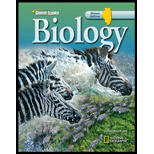
Concept explainers
Introduction: Chordates are species belonging to the phylum Chordata that at some stage during their development have four distinctive characteristics-a dorsal tubular nerve cord, pharyngeal pouches, a notochord and a postanal tail.
Answer to Problem 27A
Correct answer:
The correct answer is option (A) dorsal tubular nerve cord
Explanation of Solution
Explanation/justification for the correct answer:
Option (A) dorsal tubular nerve cord. The nerve cords in nonchordates are ventral to and below the digestive structure, and are strong. Chordates do have dorsal tubular nerve cord that is situated in or above the digestive organs and is a form of a tube. The anterior end of this cord has become the brain, and the posterior end is the spinal cord during most chordates development. So, the correct answer is option (A).
Explanation for incorrect answer:
Option (B) notochord. The notochord is an elastic, rod-like structure, extending the body length. It lies just below the nerve cord of the dorsal tubular. The notochord is replaced by bone or cartilage in most vertebrate animals. The notochord persists in the chordate of vertebrate individuals. So, this is an incorrect answer.
Option (C) pharyngeal pouches. Pharyngeal pouches are the coupled structures connecting the muscle tube which connects the cavity of the mouth and the esophagus. It includes slits leading outwards. These structures were initially used for filter feeding, and later formed into gills for water gas exchange. So, this is an incorrect answer.
Option (D) postanal tail. Postanal tail used for locomotion and situated behind the
Chapter 27 Solutions
Biology Illinois Edition (Glencoe Science)
Additional Science Textbook Solutions
Fundamentals of Anatomy & Physiology (11th Edition)
Human Biology: Concepts and Current Issues (8th Edition)
Campbell Essential Biology with Physiology (6th Edition)
Campbell Biology: Concepts & Connections (9th Edition)
Biology: Life on Earth with Physiology (11th Edition)
 Human Anatomy & Physiology (11th Edition)BiologyISBN:9780134580999Author:Elaine N. Marieb, Katja N. HoehnPublisher:PEARSON
Human Anatomy & Physiology (11th Edition)BiologyISBN:9780134580999Author:Elaine N. Marieb, Katja N. HoehnPublisher:PEARSON Biology 2eBiologyISBN:9781947172517Author:Matthew Douglas, Jung Choi, Mary Ann ClarkPublisher:OpenStax
Biology 2eBiologyISBN:9781947172517Author:Matthew Douglas, Jung Choi, Mary Ann ClarkPublisher:OpenStax Anatomy & PhysiologyBiologyISBN:9781259398629Author:McKinley, Michael P., O'loughlin, Valerie Dean, Bidle, Theresa StouterPublisher:Mcgraw Hill Education,
Anatomy & PhysiologyBiologyISBN:9781259398629Author:McKinley, Michael P., O'loughlin, Valerie Dean, Bidle, Theresa StouterPublisher:Mcgraw Hill Education, Molecular Biology of the Cell (Sixth Edition)BiologyISBN:9780815344322Author:Bruce Alberts, Alexander D. Johnson, Julian Lewis, David Morgan, Martin Raff, Keith Roberts, Peter WalterPublisher:W. W. Norton & Company
Molecular Biology of the Cell (Sixth Edition)BiologyISBN:9780815344322Author:Bruce Alberts, Alexander D. Johnson, Julian Lewis, David Morgan, Martin Raff, Keith Roberts, Peter WalterPublisher:W. W. Norton & Company Laboratory Manual For Human Anatomy & PhysiologyBiologyISBN:9781260159363Author:Martin, Terry R., Prentice-craver, CynthiaPublisher:McGraw-Hill Publishing Co.
Laboratory Manual For Human Anatomy & PhysiologyBiologyISBN:9781260159363Author:Martin, Terry R., Prentice-craver, CynthiaPublisher:McGraw-Hill Publishing Co. Inquiry Into Life (16th Edition)BiologyISBN:9781260231700Author:Sylvia S. Mader, Michael WindelspechtPublisher:McGraw Hill Education
Inquiry Into Life (16th Edition)BiologyISBN:9781260231700Author:Sylvia S. Mader, Michael WindelspechtPublisher:McGraw Hill Education





